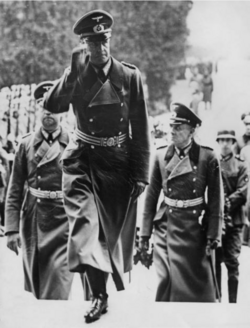Last man standing: Difference between revisions
No edit summary |
No edit summary |
||
| Line 5: | Line 5: | ||
{{quote|There is only one way this war ends: last man standing. God willing, we shall be that last man.}} | {{quote|There is only one way this war ends: last man standing. God willing, we shall be that last man.}} | ||
The failure of the [[Operation Magni|invasion of Luepola]] was realized by early 1943, and Vierzland soon faced a defensive war on multiple fronts against the [[Socialist International Coalition]] after [[Second Apelian Republic|Apelia]]'s declaration of war on X X 1943. Eschau, who | The failure of the [[Operation Magni|invasion of Luepola]] was realized by early 1943, and Vierzland soon faced a defensive war on multiple fronts against the [[Socialist International Coalition]] after [[Second Apelian Republic|Apelia]]'s declaration of war on X X 1943. Eschau, who despised oratory, was pressured by his advisors to make a public speech to improve national morale after a stream of military defeats. | ||
Revision as of 03:46, 29 December 2020
This article is incomplete because it is pending further input from participants, or it is a work-in-progress by one author. Please comment on this article's talk page to share your input, comments and questions. Note: To contribute to this article, you may need to seek help from the author(s) of this page. |
"Last man standing" is the name of a speech that was delivered by Vierz chancellor Hermann Eschau on X X 1943, in which he called for the nation to unite and prepare for total war and emphasized that it would be a historic battle for Vierzland's survival in the face of an overwhelming communist threat. It was delivered to a plenary session of the Reichsthing and broadcast on national radio. The title of the speech is derived from its famous final line:
There is only one way this war ends: last man standing. God willing, we shall be that last man.
The failure of the invasion of Luepola was realized by early 1943, and Vierzland soon faced a defensive war on multiple fronts against the Socialist International Coalition after Apelia's declaration of war on X X 1943. Eschau, who despised oratory, was pressured by his advisors to make a public speech to improve national morale after a stream of military defeats.
